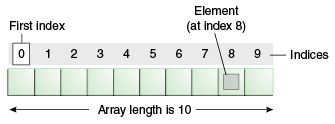Java Array
Normally, array is a collection of similar type of elements that have contiguous memory location.
Java array is an object the contains elements of similar data type. It is a data structure where we store similar elements. We can store only fixed set of elements in a java array.
Array in java is index based, first element of the array is stored at 0 index.

Advantage of Java Array
- Code Optimization: It makes the code optimized, we can retrieve or sort the data easily.
- Random access: We can get any data located at any index position.
Disadvantage of Java Array
- Size Limit: We can store only fixed size of elements in the array. It doesn't grow its size at runtime. To solve this problem, collection framework is used in java.
Types of Array in java
There are two types of array.
- Single Dimensional Array
- Multidimensional Array
Single Dimensional Array in java
Syntax to Declare an Array in java
dataType[] arr; (or)
dataType []arr; (or)
dataType arr[];
Instantiation of an Array in java
arrayRefVar=new datatype[size];
Example of single dimensional java array
Let's see the simple example of java array, where we are going to declare, instantiate, initialize and traverse an array.
class Testarray{
public static void main(String args[]){
int a[]=new int[5];//declaration and instantiation
a[0]=10;//initialization
a[1]=20;
a[2]=70;
a[3]=40;
a[4]=50;
//printing array
for(int i=0;i<a.length;i++)//length is the property of array
System.out.println(a[i]);
}}
Output: 1020407050
Declaration, Instantiation and Initialization of Java Array
We can declare, instantiate and initialize the java array together by:int a[]={33,3,4,5};//declaration, instantiation and initializationLet's see the simple example to print this array.class Testarray1{public static void main(String args[]){int a[]={33,3,4,5};//declaration, instantiation and initialization//printing arrayfor(int i=0;i<a.length;i++)//length is the property of arraySystem.out.println(a[i]);}}
Output:33354Passing Array to method in java
We can pass the java array to method so that we can reuse the same logic on any array.Let's see the simple example to get minimum number of an array using method.class Testarray2{static void min(int arr[]){int min=arr[0];for(int i=1;i<arr.length;i++)if(min>arr[i])min=arr[i];System.out.println(min);}public static void main(String args[]){int a[]={33,3,4,5};min(a);//passing array to method}}Output:3Multidimensional array in java
In such case, data is stored in row and column based index (also known as matrix form).Syntax to Declare Multidimensional Array in java
dataType[][] arrayRefVar; (or)dataType [][]arrayRefVar; (or)dataType arrayRefVar[][]; (or)dataType []arrayRefVar[];Example to instantiate Multidimensional Array in java
int[][] arr=new int[3][3];//3 row and 3 columnExample to initialize Multidimensional Array in java
arr[0][0]=1;arr[0][1]=2;arr[0][2]=3;arr[1][0]=4;arr[1][1]=5;arr[1][2]=6;arr[2][0]=7;arr[2][1]=8;arr[2][2]=9;Example of Multidimensional java array
Let's see the simple example to declare, instantiate, initialize and print the 2Dimensional array.class Testarray3{public static void main(String args[]){//declaring and initializing 2D arrayint arr[][]={{1,2,3},{2,4,5},{4,4,5}};//printing 2D arrayfor(int i=0;i<3;i++){for(int j=0;j<3;j++){System.out.print(arr[i][j]+" ");}System.out.println();}}}Output:1 2 32 4 54 4 5What is class name of java array?
In java, array is an object. For array object, an proxy class is created whose name can be obtained by getClass().getName() method on the object.class Testarray4{public static void main(String args[]){int arr[]={4,4,5};Class c=arr.getClass();String name=c.getName();System.out.println(name);}}Copying a java array
We can copy an array to another by the arraycopy method of System class.Syntax of arraycopy method
public static void arraycopy(Object src, int srcPos,Object dest, int destPos, int length)Example of arraycopy method
class TestArrayCopyDemo {public static void main(String[] args) {char[] copyFrom = { 'd', 'e', 'c', 'a', 'f', 'f', 'e','i', 'n', 'a', 't', 'e', 'd' };char[] copyTo = new char[7];System.arraycopy(copyFrom, 2, copyTo, 0, 7);System.out.println(new String(copyTo));}}Output:caffeinAddition of 2 matrices in java
Let's see a simple example that adds two matrices.class Testarray5{public static void main(String args[]){//creating two matricesint a[][]={{1,3,4},{3,4,5}};int b[][]={{1,3,4},{3,4,5}};//creating another matrix to store the sum of two matricesint c[][]=new int[2][3];//adding and printing addition of 2 matricesfor(int i=0;i<2;i++){for(int j=0;j<3;j++){c[i][j]=a[i][j]+b[i][j];System.out.print(c[i][j]+" ");}System.out.println();//new line}}}
No comments:
Post a Comment